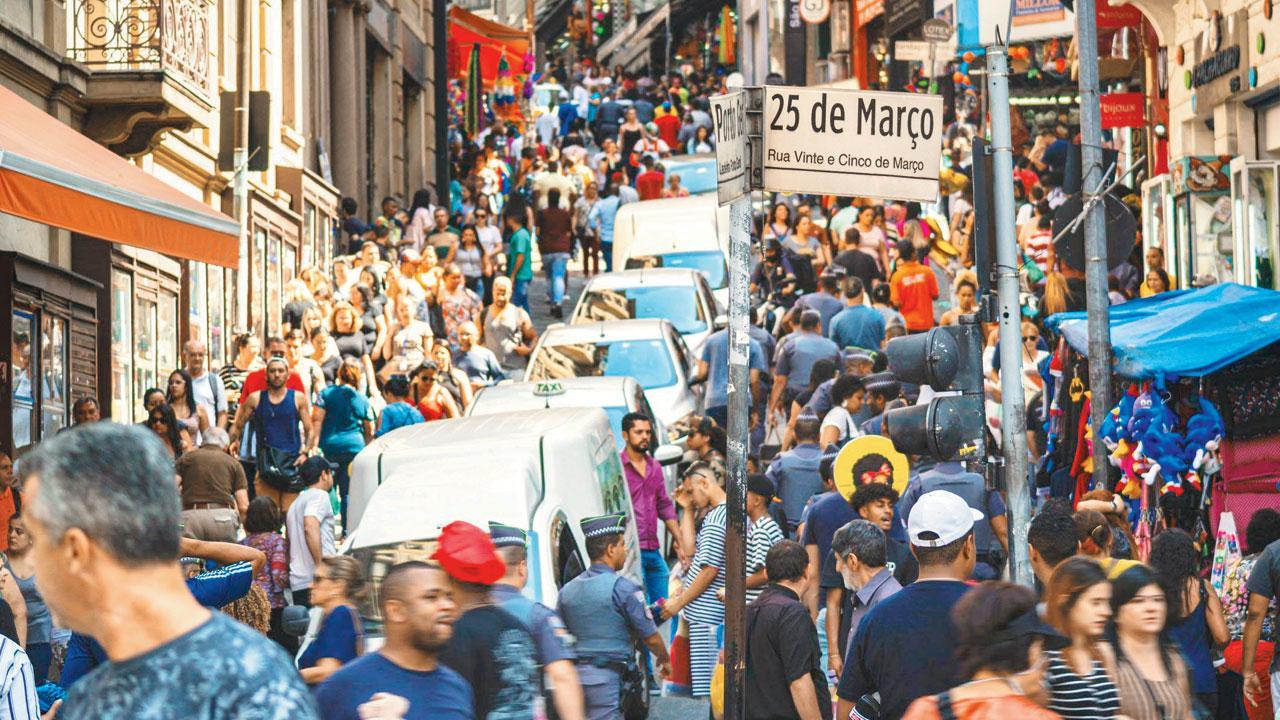Casually walking the streets of Brazil and the Americas’ most populous city to figure if they’re anything like us

Rua Vinte e Cinco de Marco, a popular shopping street in the central zone of Sao Paulo, Brazil. Representation pic
 Have you ever been to any place in the world, where, having checked out enough of its streets—there’s absolutely no picture of you at a touristy spot, to show for it? That’s São Paulo, shortened SP, or Sampa, and I. Bizarre; no?
Have you ever been to any place in the world, where, having checked out enough of its streets—there’s absolutely no picture of you at a touristy spot, to show for it? That’s São Paulo, shortened SP, or Sampa, and I. Bizarre; no?
Except for one hazy/crappy photo, before a grand church, at the City Centre. That got hurriedly clicked, because there were cops stationed. My local SP friend, Iara, would simply not allow the cellphone to be fished out of the pocket, even for a second, otherwise.
Nobody does. We’d slide into shops, cafes, malls, like shady spies, to call for an Uber! Paulistanos are evidently swift with snatching cellphones. I’m sure they pawn second-hand devices at cheap rates. But that’s not what explains this obsession.
It’s for quickly hacking into bank details/app on your phone to siphon off money. That’s what thieves are after. Lesson #1: Don’t download bank app on phone. Transact on laptop. Transactions can wait a few hours.
Feisty Iara herself has had her cellphone attacked for more times than she can recall. Gun laws in Brazil are mercifully strict. Her defence move is simple.
She screams aloud, and never lets the phone go of her hand, no matter how hard the muggers in motorbikes pull: “Push back. Look the bully in the eye. They’ll let you be.”
That’s her jungle law to deal with fellows from favelas (slums/ghettos), who throng SP’s streets, “in search of food [money], really; they’re that poor!” That’s still no excuse to steal, is it? It isn’t.
Surely Catholic, Iara tells me, “It’s got everything to do with their disconnection with religion. How else will you civilise, if not through books, and teachings [of God]?”
I don’t tell her about my own pet, pseudo/phony theory on why you barely experience muggings, etc, in India instead, where poverty and income disparity are among the globe’s highest.
The Hindu belief in rebirth has a lot to do with it. That whatever your actions in this life, you will have to pay for it in the following one. It’s much less cops/laws, more the fear of being born an insect/cockroach, that saves the rich from poor Indians. Karma’s cool, that way!
Of course, I can’t chat deep about this with Iara. Her English is at 40 per cent, which is 39 per cent higher than most Paulistanos—1.3 crore of every colour/race, including the largest number of Japanese, outside Japan—who essentially speak Portuguese. Also, Iara won’t let me talk: “Shoo! They’ll know you’re a tourist, mug you.”
God, she is paranoid—having made me sweat inside three layers of clothing in the South American winter, which is all of 10-odd degrees Celsius: “But the homeless are dying in the cold, from pneumonia,” she points out.
Sounds like India, alright. Only that SP looks as First World as it gets—as you walk into their (mostly top-end) bars, open spaces (Ibirapuera Park), top-class public art (graffiti, included), wide roads, their high-street (Oscar Freire), ‘Connaught Place’ (Paulista Avenue)…
The most important ‘First World’ criterion, to me, isn’t so much GDP/economy, as gender-ratio, among those up and about—you see more women on SP streets, than anywhere else (beats Manhattan, by a mile).
What’s equally true for Brazilian men, the young women are possibly the smartest-dressed, fittest, in the world. Almost anyone could star in a Bollywood blockbuster. I’m surprised only a couple of them have (Bruna Abdullah in Grand Masti, Giselli Monteiro in Love Aaj Kal)! Must be the distance. They’re the best-looking version of Indians.
Their own pop-culture/music scene seems strangely frozen in retro US, which as a country is also a good 10-15 hours’ flight away. Practically everywhere you go—from a hotel lobby, to an underground nightclub—it seems Michael Jackson is topping pop charts, and Shaggy’s Boombastic is the song of the season!
Also, most big countries, it appears to me, have a Delhi-Bombay (D-B) divide of their own, in terms of their chief metropolises—the one that’s got more chilled blokes, perhaps by the sea, killing it with the night-life, dive-bars, smaller spaces—generally, fewer hang-ups, with masses of all social/income groups intermingling more easily.
In Egypt, I felt that with Cairo (D), Alexandria (B); in the US, it’s probably LA (D), NYC (B); in the UAE, maybe, Abu Dhabi (D), Dubai (B); of course, it starts with our neighbours in Pakistan, who usually say, Lahore (D), Karachi (B)…
Largely landlocked, SP is decidedly ‘D’! People seem more inward. They hang out a lot in fancy hotels. The poor from favelas have been relegated to the outskirts. Breezy Rio De Janeiro, with its slums staring straight at high-rises, sounds more ‘B’.
Maybe I’m thinking so, because I caught dengue fever from Delhi once. And from the streets of SP, only a few months later, again!
Dengue, being an incurable, viral epidemic, around since the late 1700s, common to the tropics (India,
Brazil), that top labs in the West have had no reason ever to invent a vaccine for. Virus not ‘First World’ enough?
Yes, we’re both Third World. That said, Delhi dengue felt like it was gonna kill me. SP relapse was milder. If it helps to know the score, Delhi mosquito: 1, SP: O.
Mayank Shekhar attempts to make sense of mass culture. He tweets @mayankw14
Send your feedback to mailbag@mid-day.com
The views expressed in this column are the individual’s and don’t represent those of the paper.
 Subscribe today by clicking the link and stay updated with the latest news!" Click here!
Subscribe today by clicking the link and stay updated with the latest news!" Click here!








